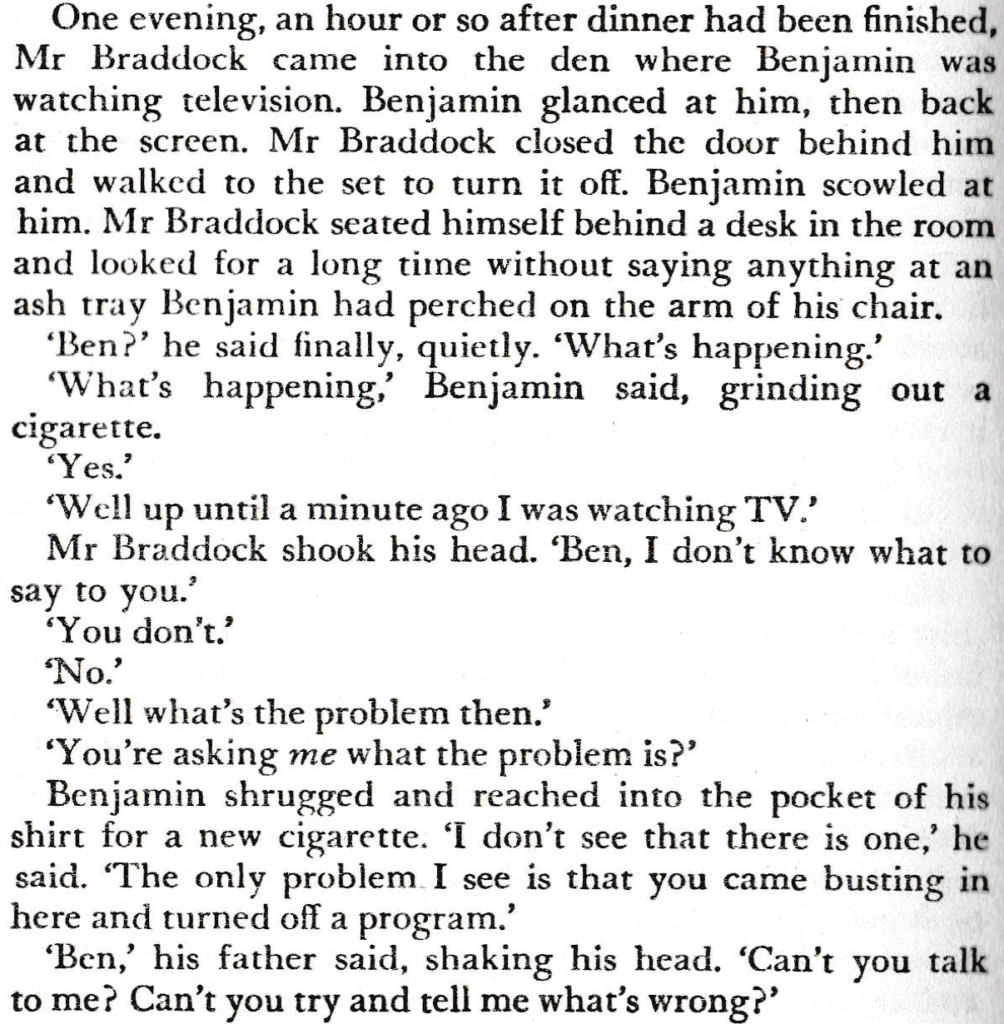THE BOOK
Overview
When Charles Webb, the son of a cardiologist and a socialite, had his first novel The Graduate published in 1963, he was only twenty-four years old and freshly graduated two years earlier with a degree in American literature and history from a college in Massachusetts, USA.
He had no plan whatsoever to become rich and famous as he apparently began to write fiction to simply follow his inclination as an artist. And her mother helped him to eventually find a publisher in New York, although both parents had never approved of his artistic tendency and occupation.
The reviews the book received, right after its publication, were indifferent or outright negative, one of which by Orville Prescott, the main book reviewer for The New York Times for 24 years, stating that the book was a “fictional failure”, reducing the main character to just a copy of JD Salinger’s Holden Caulfield.
With no interest in material things and possessions of any sort, Webb sold the movie rights to his novel for a flat fee of $20,000 and refused an additional $10,000 offered by the producer after the film had literally made millions of dollars giving Webb’s book the status of bestseller for the coming years and generations. This in particular had haunted him for the rest of his life.
Benjamin Braddock, the protagonist, flies home after his graduation and is forced to attend a party with all his parents’ rich friends at his house where also the much older but still attractive Mrs Robinson, the wife of his father’s business partner, is. Benjamin gives her a lift home with his brand-new sports car and, after she strips naked in front of him, the affair breaks loose with clandestine encounters at the infamous Taft Hotel. The trouble starts and things turn nasty when Mrs Robinson’s daughter Elaine comes into the picture and Benjamin decides to marry her.
The story is told with a spare style, nearly essential, and a wry sense of humour with abundance of dialogues that sounds prophetically made for a movie, in fact over 80% of them were used intact in the movie script.
The “dull and inexpressive language” of Benjamin, as Hanif Kureishi, author of My Beautiful Laundrette, points out in his introduction for the 2010 Penguin Classics edition of The Graduate, reflects his inadequacy and sense of not belonging to the world surrounding him with “most of his speech consisting of questions”.
The book is easy as well as quick to read – this is technically a novella which is meant to be much shorter than a full novel – and has a plot, or series of events, that flows with a good rhythm and no obstacle in the way for the reader who is genuinely eager to go all the way to the end to find out the fate of Benji.
But one of the strengths of the book still remains the character of Mrs Robinson which is indelibly part of the collective memory of an entire generation; a well-off middle-aged seductress (what nowadays can be classed as a cougar, if not worse!) tired of her life and incapable of loving her own husband who starts an affair with a kid for sex only and not for having conversations, self-confident and vengeful enough to turn, if need be, into a creature as much monstrous and perverse as beautiful and sophisticated.
Well, up until a minute ago I was watching TV
Webb’s novella consists of three parts and just seven chapters in total. Two in the first part, three in the second one and, eventually, two in the third and last part of the book. Here we are in the second part and the chapter of the book is precisely the fourth. The book has a third-person narration with an omniscient point of view.
Benjamin spends most of his time at home getting up late in the morning or early in the afternoon and dressing in his bathing suit. Using an old rubber raft found in his home garage, he normally sits on it while floating idly on the swimming pool and drinking beer. This lazy routing goes on for the rest of the day until dinner time with his parents.
In the night, when he does not disappear to meet up with the fabulous and enigmatic Mrs Robinson to consume their affair in the Taft Hotel, Benjamin stays in the home snug to drink beer and bourbon or some other drink, smoke cigarettes and watch TV or a movie until late.

An hour or so after dinner, one evening, Mr Braddock, the father, decides to confront his son in the snug, so he turns off the television, sits down for a while without speaking, then he just asks him straight what is happening. Here Benjamin cannot help but using a great dose of sarcasm and tell his father: “Well up until a minute ago I was watching TV”. Mr Braddock shakes his head and tries to lecture his son about future and values by, among other means, asking questions of the kind “what is wrong”, “have you just lost all hopes”, “what do you do when you take off after dinner”, “do you have any plans at all” and so on.
Benjamin senses the melodrama in the air, so the conversation leads inevitably to nowhere until Mrs Braddock, Benji’s mother, knocks on the door to tell them that Mr and Mrs Robinson came to pay a visit.
The dialogues are engaging and vividly realistic to the extent that the reader feels the uncomfortable position where a father could get himself into when a son crosses the border between taking a short break after his graduation and getting carried away so much so to become a true parasite that does nothing all day. They soberly express the conflict between two different and colliding realities, one represented by the parents’ high expectations on their son who needs fitting in their world of success, parties, material possessions, bourgeois values and so on and the other one of that son himself who just wants to break free from all of that or, at least, be left alone.
The language of Ben might sound dull and inexpressive, yet and maybe involuntarily, specially here, he manages to be quite humorous and have the formidable skill to completely baffle his parents with his own world of uncertainty, boredom and alienation.
READ IT!
There is a good number of editions at affordable prices but the 2010 Penguin Classics edition, which has been already mentioned, is a good choice if you are looking for a paperback book quite compact (192 pages) and with an excellent layout. The introduction of Hanif Kureishi is brief and straight to the point. LINK/S
The hardcover editions or the older ones with Penguin are a bit outdated in their layout and have more pages. They are considerably more expensive as they seem to be items for collectors but, in fairness, they are not worth it if you just wish to read The Graduate, enjoy the story and stick the book in your pocket! LINK/S
The audible version of the novella is quite affordable, if not free with trials, and seems to be a good choice, too, while the Kindle edition on Amazon seems to have got so stretched out to reach over 270 pages… LINK/S
